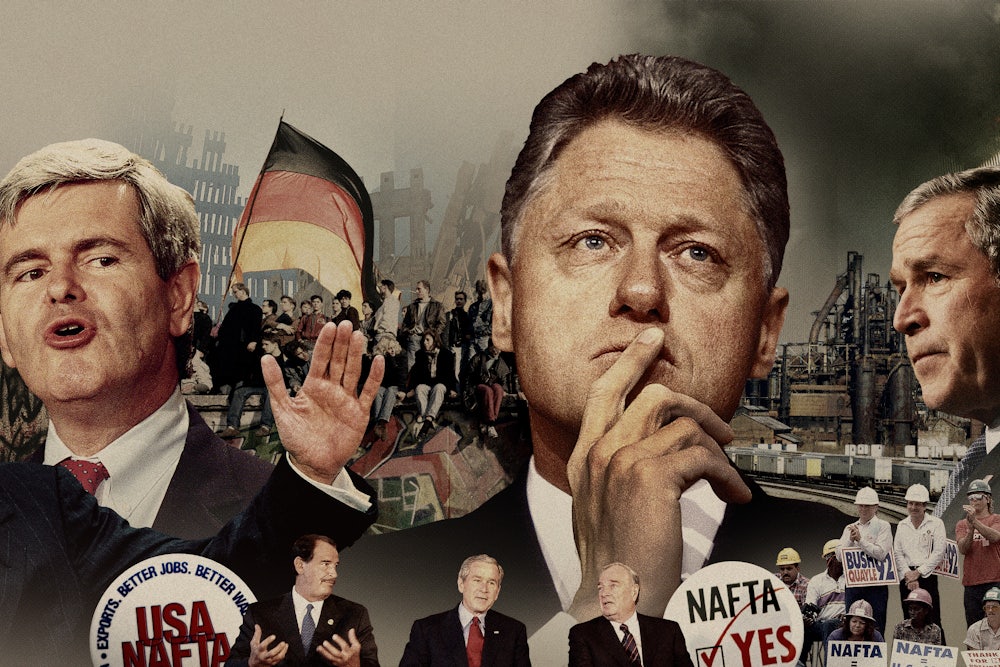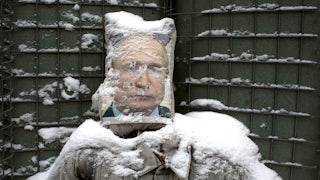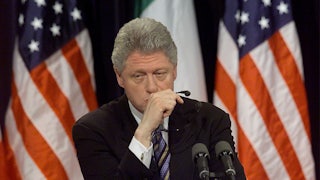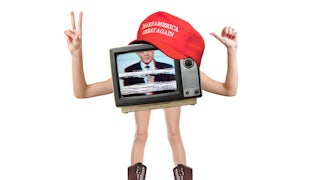On the evening of November 9, 1989, thousands of East Germans—including a 35-year-old chemist named Angela Merkel—peacefully crossed into West Berlin amid chaos and the confusion at the Berlin Wall. Within hours, the gates of the most notorious symbol of the Cold War opened for good, as champagne flowed and jubilant Germans with pickaxes began to lop off large chunks of the wall.
It was midafternoon at the White House when Brent Scowcroft, the national security adviser, walked into the Oval Office to tell George H.W. Bush that initial reports suggested the wall had been opened. But any public jubilation was tempered by the guiding principle of Bush’s career—prudence. As Bush biographer Jon Meacham recounts in Destiny and Power, “Borrowing a phrase from Scowcroft, Bush was determined not to ‘gloat.’” Meeting with reporters in the Oval Office, Bush struck a tone so subdued that CBS reporter Lesley Stahl said, “This is a sort of great victory for our side in the big East-West battle, but you don’t seem elated.” Bush’s response at this epic turning point in modern history: “I’m not an emotional kind of guy.”
Even when the president met with Mikhail Gorbachev in Malta in December of that year to symbolically ratify the end of the Cold War, Bush’s words were muted. For more than four decades—through proxy wars in Korea and Vietnam and an eyeball-to-eyeball nuclear confrontation during the Cuban Missile Crisis—the world had teetered on the brink. But throughout his presidency, Bush never displayed half the enthusiasm over the collapse of communism that he had as a Yale first baseman every time his team defeated Harvard. Bush’s restraint has been praised by foreign policy experts—but it also deprived Americans of a stirring moment of national unity over the end of the Cold War and the fears of nuclear Armageddon.
In the current era of pandemic, polarization, insurrection, war in Ukraine, dramatic climate change, and the fraying of democracy, it is difficult to conjure up what the United States was like during the glorious, nearly 12-year period that began on November 9, 1989. With Russia on the ropes and China still emerging from its Maoist slumber, the United States dominated the world. As Michael Mandelbaum, an emeritus professor at the Johns Hopkins University School of Advanced International Studies, asserts in his new book, The Four Ages of American Foreign Policy, “The international position that the United States assumed in the wake of the Cold War was one that no other country held or had ever held.” And, yes, that includes ancient Rome and the British Empire.
This period also brought with it, for the most part, boom times at home. Despite a short recession in 1990 and a dot-com stock market collapse in 2000, the era was marked by a steadily declining unemployment rate, which hit 4 percent in 2000, the lowest figure in three decades. The millennium ended with balanced budgets—in fact, Bill Clinton bequeathed George W. Bush a $236 billion surplus—and widespread talk of paying off the entire national debt. In April 2001, Federal Reserve Chairman Alan Greenspan—no fan of “irrational exuberance”—predicted in a major address, “While the magnitudes of future federal unified budget surpluses are uncertain, they are highly likely to remain sizable for some time.”
Of course, there were festering problems—race relations, growing inequality, the rise of the culture wars, politics becoming a blood sport, and a nation that worshipped wealth as if we had returned to the Gilded Age. But for most Americans who were alive then, the 1990s were the best years of our lives. No fears of nuclear war, a sense that permanent prosperity was at hand, and a smug feeling that the world was about to enter into its second American Century. Titanic, the highest-grossing movie of the 1990s, said it all—we were awash in luxury and bristling self-confidence until we hit the iceberg on September 11, 2001.
Looking back from the perspective of this dismal decade, we can now see the glory years of the post–Cold War United States as a tragedy. So many problems today (massive income inequality, global warming, Vladimir Putin’s bellicose one-man rule in Russia, and the threat of authoritarianism here at home) could have been lessened by smart and aggressive government action during these 12 years of peace and prosperity. Instead, the period between the fall of the Berlin Wall and 9/11 was a time of missed opportunities.
Despite the political appeal of Fleetwood Mac singing “don’t stop thinking about tomorrow,” the dominant ethos of the era was Think Small. Part of it was the status quo leadership of the era—which, for the most part, included Bill Clinton—and part of it was a restive electorate who wanted change but couldn’t define what that meant. But the conceptual failure transcended politics and elections. This was the Seinfeld age—12 years about nothing beyond an ill-defined belief in a glorious technological future. Part of the problem was that Americans, after more than a decade of anti-government rhetoric under Ronald Reagan and George H.W. Bush, had a truncated view of what might be achieved by an ambitious president. When Clinton declared in his 1996 State of the Union address, “The era of big government is over,” he was reflecting the polls and public sentiment.
There is a larger point beyond regret in revisiting these lost years of post–Cold War triumphalism. This era serves as a cautionary reminder that if the voters demand little of government beyond lower taxes, that’s about all they are going to get. The 1990s also brought with them a reminder of the folly of expecting the free market and profit-seeking corporations and financiers to uplift society and transform the globe. To understand where the nation went wrong during this pivotal 12-year-period, I will examine the might-have-beens in three crucial arenas—the economy, the world, and American society.
THE ECONOMY
The 1990s and early aughts were a high point of government by the elite and often for the elite. There was, in particular, a well-bred insularity to the two Bush presidencies—a sense that the United States was populated by people (mostly men) who came from the right families, went to the right schools, and ran the right companies.
In his acceptance speech at the 1988 Republican National Convention, Bush Sr. tried to convince conservatives of his faith in Reaganism by declaring, in words crafted for him by Peggy Noonan, “Read my lips: No new taxes.” The line worked, as Bush crushed Michael Dukakis in the 1988 election with the entire GOP behind him. But Bush’s old-fashioned balanced-budget ethos (which had once prompted him to denounce supply-side theory as “voodoo economics”) prevailed in late 1990. Preoccupied with the planning of the Gulf war to liberate Kuwait after Saddam Hussein’s invasion, Bush went along with a congressional budget compromise that raised the highest marginal tax rate from 28 percent to 31 percent. It may have been responsible governance, but it came at a price the country is still paying. House Republicans led by Newt Gingrich revolted when Bush agreed to raise taxes. Grover Norquist’s anti–new-tax pledge became religious gospel for congressional Republicans. And with a few very minor exceptions, Republicans in Congress have not backed a single tax increase in three decades.
With the country shakily recovering from a recession, nothing about Bill Clinton’s 1992 presidential campaign suggested a continuation of the green-eyeshade, cut-the-deficit zeal of the Bush administration. But the great turnabout came in a meeting in the Governor’s Mansion in Little Rock about two weeks before Clinton was even inaugurated. Bush aides, the day before, had leaked the news that deficits were projected to run over $300 billion a year throughout Clinton’s first term. As Bob Woodward tells it in The Agenda, Clinton exploded as he was told again and again by his mainstream economic advisers that Wall Street needed to be wooed with deficit reduction. Red-faced with anger, Clinton bitterly asked, “You mean to tell me that the success of my program and my reelection hinges on the Federal Reserve and a bunch of fucking bond traders?”
This was the moment when the ambitious Keynesian dreams of the Clinton campaign were lost. Had the president followed his own initial instincts and the advice of his political advisers, his economic agenda would have been far bolder than a half-hearted attempt at passing a stimulus package and trying and failing to enact a health care plan. By late 1993, according to Woodward, a frustrated Clinton was mockingly describing himself as a Dwight Eisenhower Republican, which underscored how far to the center he had drifted.
The Clinton years brought with them liberal governance by those with high SAT scores. Few in the Clinton orbit—other than the president himself—had a visceral sense of the white working class, which was once a dominant element in the New Deal coalition. That may help explain these economic numbers: From 1991 to 2000, the incomes of those in the top 5 percent rose at an annual rate of 4.1 percent. For those in top 20 percent, it was 2.7 percent annually. And for everyone else (80 percent of the working population), incomes grew at a stagnant rate of 1 percent. This was economic inequality on the march.
Clinton always had a secondary political agenda—to belatedly defuse Ronald Reagan’s attacks on the Democrats. For all of Clinton’s campaign talk about “building a bridge to the twenty-first century,” much of his administration was backward-looking in an effort to refight and finally win the battles of the 1980s.
That explains the hard-line 1994 crime bill (championed at the time by Senator Joe Biden), and Clinton signing 1996 legislation that revamped and toughened welfare. The text of a 1996 Jules Feiffer cartoon captured the essence of this side of Clinton: “I am morally troubled by the welfare reform bill because it punishes the weak ... who, come to think of it, don’t vote, while everyone who resents them does! So I better hold my nose and sign the welfare reform bill. Because if I don’t get reelected, who’s going to stand up for the poor?”
Despite the opposition of labor, Clinton reluctantly endorsed the North American Free Trade Agreement with Canada and Mexico, negotiated by the Bush administration, late in the 1992 campaign. Once in office, though, Clinton emerged as an ardent free trader, calling more than 200 House members to push for ratification of the treaty. George Stephanopoulos, in his White House memoir, All Too Human, brooded at the time that NAFTA was “a stick in the eye of our most loyal labor supporters.” Signing NAFTA in the Oval Office in late 1993, Clinton warbled, “Good jobs, rewarding careers, broadened horizons for the middle-class Americans can only be secured by expanding exports and global growth.” As for those inevitably left behind by globalization, Clinton offered these reassuring words, “Every worker must receive the education and training he or she needs to reap the rewards of international competition rather than to bear its burdens.”
Globalization coupled with vast technological change were, of course, unstoppable forces, and crude protectionism would have been as ineffective as King Canute confronting the tides. But the failure of the Clinton administration and free-trade Democrats was rooted in an inability to understand how entire communities in the industrial Midwest would be devastated by the wrenching transition. “Of course, everyone knew there would be losers from free trade,” said Elaine Kamarck, a senior fellow at the Brookings Institution who served on Al Gore’s staff during the Clinton years. “But they believed that trade adjustment assistance and job training would help them get over it. That was the great fallacy. Steelworkers didn’t want to become X-ray technicians, even if they could.”
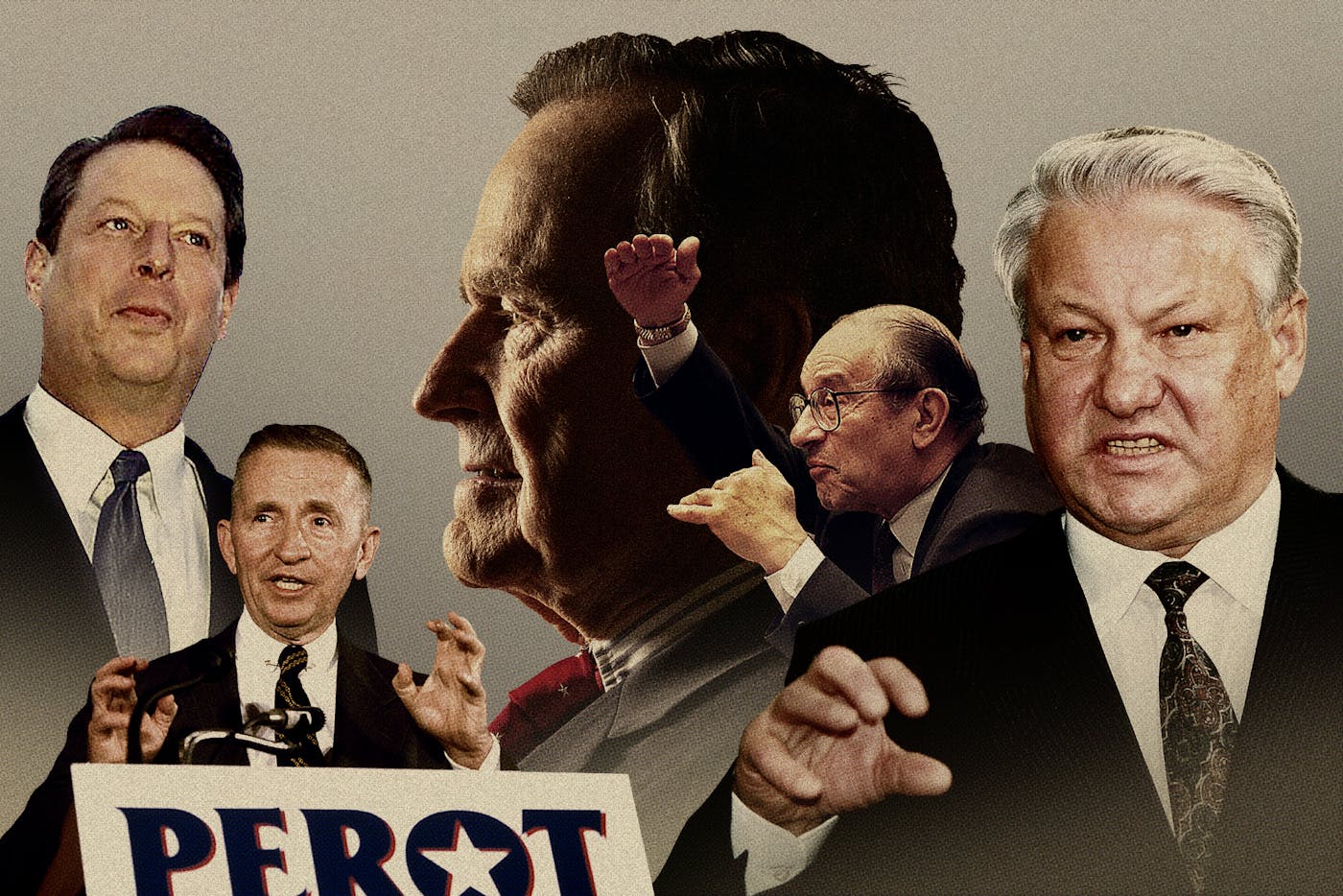
Long-term thinking was not completely abandoned in Washington, but the emphasis was on the wrong future problems. There was an obsession among elite policymakers in both parties that the Social Security Trust Fund would not be able to make full payments in the 2030s without additional subsidies from Congress. (That is still the case.) But somehow this was regarded as an urgent national problem during Clinton’s second term. Confronted with a growing Republican chorus demanding major tax cuts, Clinton in his 1999 State of the Union address responded with the most politically appealing counterargument that he could muster: “Save Social Security First.” The president proposed that 60 percent of the budget surplus for the next 15 years should go directly into the trust fund. Clinton argued, “We should put Social Security on a sound footing for the next 75 years.”
But thanks to George W. Bush, nothing in Washington was left on a sound footing—even before the September 11 attacks. In June 2001, Bush proudly signed a $1.35 trillion tax cut that sprinkled most of its bounty on the wealthiest Americans, and he enacted another alms-for-the-rich rate reduction in 2003. Even without Bush’s maladroitly managed wars in Iraq and Afghanistan, Clinton’s gritted-teeth austerity was wiped out as soon as the Republicans squeaked into the presidency.
THE WORLD
Looking back on the heady period after the fall of the Berlin Wall and the collapse of the Soviet Union in 1991, it might be tempting to ask, “Who lost Russia?” The truth was, of course, that Russia was never ours to lose. But dating back to the George H.W. Bush years, the United States consistently, through shortsightedness and neglect, took steps that undermined Russia’s transition to democracy and a healthy market economy. Economist and Russia expert Anders Aslund has long argued that a pivotal moment came in November 1991, when the United States and the other G-7 countries refused to forgive the international debts of the defunct Soviet Union. This was a story that never won front-page coverage in the United States, but it stung in Moscow. In a 2000 paper, Aslund argued that the G-7’s only “interest was to secure their claims on the Soviet Union, which they also did in an untenable way. The young Russian reformers were shocked and dismayed by the G-7’s total disinterest in their reform plans.”
Under Clinton, Russia—like every other aspect of foreign policy—became entangled with domestic political concerns and crises. Even penny-ante scandals ginned up by the press and kept alive by the GOP for years after investigations found dry holes, like a failed Arkansas real estate deal called Whitewater, cast a pall. On Clinton’s first trip to Moscow in early 1994, I recall the traveling press corps being instructed as we checked into the Metropol Hotel late at night: “Room keys to the right. Whitewater statements to the left.”
If there was a pivotal moment in the deterioration of relations with Russia, it was probably Clinton’s cheerleading for NATO expansion into former Soviet bloc countries like Poland, Hungary, and the Czech Republic, which formally occurred in 1999. But the seeds had been planted much earlier, as Clinton had stressed to Polish President Lech Walesa on a visit to Warsaw in 1994 that he strongly supported bringing Poland into the alliance. But throughout the lengthy process, Clinton continually demonstrated a tin ear about Russia’s concerns for its security and prestige. In his autobiography, My Life, Clinton admits that he was blindsided by a 1994 speech by Boris Yeltsin attacking NATO expansion and the United States for wanting a “cold peace” in place of the Cold War. Clinton blithely dismissed it as merely Russian domestic politics: “Yeltsin’s advisors had convinced him that NATO would admit Poland, Hungary, and the Czech Republic in 1996, just when he would be running for reelection against the ultra-nationalists who hated NATO expansion.”
As Clinton soon learned, Yeltsin was—even on his best days—an unsteady partner in democracy. On his worst days, the Russian president was an out-of-control drunk who once, while staying at Blair House across the street from the White House, tried to hail a cab in the middle of the night in his underwear. But for all of Yeltsin’s failings, there was never a point when the Clinton administration seriously addressed the legitimacy of some of the Russian president’s concerns about thrusting NATO eastward. In a 1997 article, George Kennan, the nonagenarian architect of containment during the Cold War, bitterly called NATO expansion “the most fateful error of American policy in the entire post–cold-war era.”
An equally serious U.S. mistake with Russia was to cheer from the sidelines for the privatization of former Soviet assets while doing too little to smooth the wrenching transition to a free-market economy. The late 1990s Russian economic collapse, in tandem with an Asian financial meltdown, doomed Yeltsin and maybe even the entire Russian democratic experiment. As Mandelbaum summarizes in The Four Ages of American Foreign Policy, “The American government and American advisors had not had decisive influence on Russian economic policies, but the Russian public faulted them for the reforms’ shortcomings all the same.”
Without any U.S. mission in the world beyond a fuzzy idealism, Clinton probably rightly concluded that voters would not tolerate any American military casualties. When 18 American troops died in Mogadishu in October 1993 during a peacekeeping mission that had begun under Bush, Clinton quickly withdrew all remaining U.S. troops from Somalia. Throughout the darkest days of the war in Bosnia, Clinton repeatedly cited Robert Kaplan’s book, Balkan Ghosts, as evidence that it would be futile to try to resolve these ancient enmities. Only after Richard Holbrooke negotiated the Dayton Accords in late 1995 did the United States commit 20,000 troops to maintain the fragile peace in the Balkans. There were virtues to Clinton’s foreign policy, like the Good Friday Agreement that brought peace to Northern Ireland. He came oh-so-close to a Middle East peace deal. And he was serious enough about terrorism that he tried to take out Osama bin Laden with a cruise missile. In keeping with the temper of the times, the missile attacks in Afghanistan and Sudan were ridiculed as a Wag the Dog diversion from the vital business of the nation—holding the president accountable for his out-of-control sexual behavior.
Clinton, a student of history, longed for greatness in foreign policy. In The Clinton Tapes, Martin Luther King Jr. biographer Taylor Branch, a friend of Clinton’s since the 1970s, describes the president’s struggle to come up with a better label for the 1990s than the “post–Cold War era.” But the best that Clinton could muster was the naïvely hopeful “age of global democracy.”
AMERICAN SOCIETY
The 1992 election is rarely considered a turning point in U.S. politics. But looking back, many of the rumblings that gave rise to Trumpism had their origins in two separate populist revolts against the elitism of the first Bush presidency.
Enraged by Bush’s read-my-lips apostasy on taxes, Pat Buchanan (an incendiary right-wing columnist and a former Richard Nixon and Ronald Reagan White House speechwriter) ran against the president as a protest candidate in the 1992 primaries. Deliberately borrowing Charles Lindbergh’s isolationist slogan, “America First,” Buchanan campaigned as a fierce foe of free trade and silver-spoon Yalies as well as a tribune of Reaganite anti-tax purity. On the night of the New Hampshire primary, as he won nearly 40 percent of the vote against a sitting president, Buchanan chortled, “What began as a little rebellion has emerged into a full-fledged middle-American revolution. We are going to take our party back from those who have walked away from us and forgotten about us.”
A quarter-century later, the populist rabble did rout the GOP establishmentarians. But in 1992, New Hampshire was the high point for the Buchanan Brigades. In a foolhardy effort to spur party unity, the Bush forces offered the fire-breathing columnist a prime-time speaking slot at the Republican National Convention in Houston. Buchanan delivered a full-throated “Culture War” speech that Molly Ivins mockingly claimed “probably sounded better in its original German.” Appealing to the fast-growing intolerant wing of the Republican Party, Buchanan invoked both Bill and Hillary Clinton as he thundered, “The agenda that Clinton & Clinton would impose on America—abortion on demand, a litmus test for the Supreme Court, homosexual rights, discrimination against religious schools, women in combat units—that’s change, all right. But that’s not the kind of change ... we can abide in a nation that we still call God’s country.”
The biggest warning about the fragility of the two-party political system originated during Larry King’s quirky CNN interview show in late February 1992. His guest that night was Ross Perot, a jug-eared Texas billionaire with a twangy voice. Toward the end of the interview, Perot blurted out that he would run for president if volunteers would put his name on the ballot in all 50 states. Three months later, with few of the trappings of a normal campaign, Perot led both Bush and Clinton in a Time magazine poll in a three-way presidential race.
Here were two nonthreatening mainstream presidential candidates—a cautious incumbent (Bush) and an appealing youthful governor (Clinton). Yet more than a third of the voters wanted to opt out of the two-party duopoly in the misguided belief that an overconfident billionaire could save the nation.
Explaining Perot three decades later is as hard as deciphering other 1990s phenomena like the Macarena. Actually, having interviewed Perot in May 1992, I considered him hard to figure out then. Even though Perot was passionate about a balanced budget and dramatically warned that the North American Free Trade Agreement would lead to a “great sucking sound” of jobs being exported, his independent candidacy was based far more on his persona than on particular issues. Part of it was the appeal of Perot’s self-made fortune, since voters continually fall for the truth expressed by Tevye in Fiddler on the Roof: “When you’re rich, they think you really know.” Perot flirted with authoritarian notions like instant national referenda to decide policy issues. Again and again, Perot claimed that complicated political problems had a “simple answer” obvious to him but beyond the ken of ordinary politicians. Perot had particular disdain for Bush, claiming at one point that shadowy forces connected with the president had planned to disrupt his daughter’s wedding.
Perot dramatically withdrew from the 1992 campaign in the midst of the Democratic National Convention and then returned to the race in early October, muttering darkly about the Bush family. His 19 percent of the popular vote (he did not carry a single state) was the best showing by a third-party candidate since Teddy Roosevelt, running on the Bull Moose line in 1912. According to exit polls, Perot won the support of 17 percent of Republicans and 13 percent of Democrats. But political analysts have wrangled ever since over whether Perot tilted the election to Clinton or whether Bush was inevitably doomed by his own political ineptitude. Perot’s lasting legacy was his mockery of free trade and his near-religious belief that God should have chiseled a balanced budget into the Ten Commandments.
While Perot’s gimlet-eyed fear of budgetary red ink fit with the views of elite thinkers, his warnings about the costs of free trade were dismissed as Luddite nuttiness by the leaders of both parties.
Another marker in the erosion of democratic norms came with the 1994 GOP off-year congressional landslide and the elevation of Newt Gingrich into a position of power. The bombastic Gingrich lasted only four years as House speaker, but his ascendency marked a turning point for the Republican Party. Gingrich, a former history professor, radiated the essence of faculty politics—viciousness and vitriol even when the stakes were small. Everything to Gingrich was a matter of high principle, aside from his tangled personal finances (he tried, for example, to get away with a sweetheart $4.5 million book deal immediately after the 1994 election) and his marital history (don’t ask).
A three-week governmental shutdown during the 1995–1996 Christmas holiday season served as an introduction to a reborn Republican Party that cared more about ideological temper tantrums than effective governing. During the protracted budget negotiations that began during the fall, it often seemed as if Clinton and Bob Dole, the Senate majority leader, were playing responsible adults and Gingrich was performing the role of petulant child. Gingrich never fully recovered from the mockery that he inspired after complaining about the indignity of having to sit in the back of Air Force One—ignored by the president—on the flight back to Washington from the funeral of Israeli Prime Minister Yitzhak Rabin. And, yes, poor Newt also had to exit via the rear staircase at Andrews Air Force Base.
The irony is that many of the pyrotechnics that dramatized the relationship between Clinton and Gingrich were unnecessary. The two men with large appetites shared some of the same goals—whether it was reforming welfare or creating a glide path to a balanced budget. But rather than regarding compromise as the logical work product of divided government, Gingrich treated each legislative agreement as a momentary pause in a titanic clash of civilizations.
In hindsight, it seems bewildering that Clinton—a centrist Democrat who presided over good times with few foreign misadventures—inspired such Republican rage. The “vast right-wing conspiracy” was reality rather than a paranoid fantasy of Hillary Clinton. While the Clintons could play fast and loose with the precise truth, so many scandals of the 1990s were concocted out of a few pieces of paper and a gust of wind. An ill-advised 1993 effort to eliminate seven staff positions in the White House travel office was treated as akin to Teapot Dome. The suicide of Vince Foster, the deputy White House counsel, triggered a raft of deranged conspiracy theories about murder plots. And Whitewater morphed into special prosecutor Kenneth Starr playing Inspector Javert in a legally overwrought examination of the president’s sex life, which ultimately led to Clinton’s 1998 impeachment—an early example of the GOP misusing the Constitution solely to appease the Republican base.
There is a myth that the Republican drive to impeach Clinton prevented the president from accomplishing great things in his second term. But the 1997 State of the Union address—delivered nearly a year before Americans had ever heard the name Monica Lewinsky—suggests that Clinton’s second-term agenda was almost Bush-esque in its dearth of ambition. The speech’s centerpiece lay in this sentence: “First, we must move quickly to complete the unfinished business of our country—to balance our budget, renew our democracy, and finish the job of welfare reform.”
That was the unfinished business of the nation?
The unequivocal message from the 1990s: Washington only cares about long-term problems that poll well. During this period—partly due to conservative misinformation—voters were apathetic about the risks of global warming. A July 1999 NBC News/Wall Street Journal poll found that only 23 percent of Americans believed that climate change was “a serious problem and immediate action was necessary.” In contrast, 43 percent of those polled were either uncertain about the data or convinced that “concern about global climate change is unwarranted.”
More than anyone in American public life, Al Gore, the 2000 Democratic nominee, was equipped with both passion and knowledge to take the case for urgent action to the voters. But dating back to the 1992 campaign, when Bush denounced Clinton’s running mate as “Ozone Man,” Gore’s environmental zeal was regarded by some Democrats as a political liability. In his acceptance speech at the 2000 Democratic National Convention in Los Angeles, Gore devoted exactly one sentence to the cause of his lifetime: “We must reverse the silent rising tide of global warming, and we can.” Elaine Kamarck, who worked for Gore in that campaign, said in an interview, “I blame the political consultants who argued against him talking about climate change. They said it was too wonky and everyone knew that Al Gore was against climate change.”
The 2000 election had other ironies: George W. Bush—soon to be the architect of the cataclysmic invasion of Iraq—strenuously argued in his second debate with Gore, “I don’t think our troops ought to be used for what’s called nation-building.” Pat Buchanan, running as a third-party candidate, may have inadvertently handed the election to Bush. A badly designed “butterfly ballot” in heavily Democratic Palm Beach County in Florida prompted an estimated 2,000 voters to mistakenly cast their ballot for Buchanan—which was more than enough to throw Florida and the election to Bush.
The lesson from this lost decade is counterintuitive. During boom times like the 1990s, our political culture is too shortsighted and too obsessed with minor tactical gamesmanship to tackle long-term problems. Only when matters become dire (during the Depression for building the social safety net and during the turbulent 1960s for civil rights legislation) does the United States act boldly. In a sense, the mantra for those questing after social change in the years ahead might well be, “May you live in troubling times.”
But the throbbing hangover from the carefree post–Cold War years endures. In an alternative universe, the Clinton administration would have provided lasting balm for the struggling working class; the United States, beginning in 1991, would have made fostering democracy in Russia a priority instead of treating Moscow with benign neglect; the 2000 presidential campaign would have alerted Americans to the necessity to act boldly on climate change; and the Perot and Buchanan rebellions of 1992 would have reminded the political class of the fragility of democracy even at the best of times. Instead, we got an endless lost weekend that stretched over 12 years from the Berlin Wall to the rubble of the World Trade Center. And looking back sadly, the United States will probably never have another halcyon period like that to squander with minimalist ambitions and guttersnipe politics about nothing.
